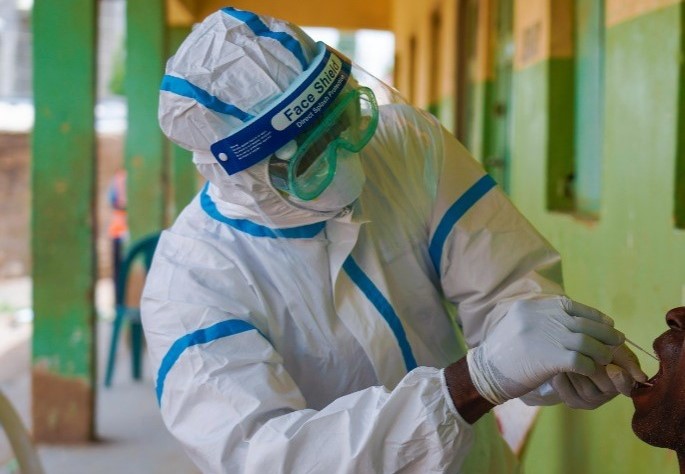Editor’s Note: Dr. Ibrahim Mamadu has been part of World Health Organisation (WHO) Nigeria’s team supporting the country’s preparedness and response to the COVID-19 outbreak in Nigeria in several states, including Ogun, Katsina, and most recently, in Kano. In this Thought Leadership piece he documents his insights into the response and outlines lessons learned from the perspective of a public health epidemiologist.
What a few months it has been! In fact, it is hard to believe it has ONLY been three months! Time has virtually stood still since February 27th, when the first COVID-19 case was confirmed in Nigeria.
On my return to Nigeria in January from a 6-week mission in the Republic of Congo since late December 2019, I found that work was in full swing by the Nigeria Centre for Disease Control (NCDC), the Federal Government, and partners in preparedness for the novel coronavirus outbreak that was spreading fast across the world, through a preparedness multisectoral technical working group. I quickly joined in the race to improve the country’s level of readiness.
We had worked hard for weeks and had reached the point where we had organized a Simulation Exercise (SIMEX) to test all the systems, guidelines, protocols, equipment, training of personnel we had tried to improve over the period. Ironically, after conducting a very successful first day of the Simulation, at 1:00 am that night, the calls and emails started pouring in; there was a confirmed case in Nigeria! The next day passed in a blur, and time seemed to stand still. Before I knew it that morning, the national Emergency Operations Centre (EOC) was activated at the NCDC, teams were deployed to go and support the states’ responses, I was racing home to get my prepacked go-bag and to share a few words with family, then it was off to the airport with the WHO team, landing in Lagos at night and proceeding straight to the Lagos State EOC to get briefed.
The Lagos Incident manager quickly brought us up to speed; a 44-year-old male consultant had flown into Nigeria on the 24th of February, spent a night in a hotel in Lagos and was driven to Ogun state the next day to work in a company. He had started feeling unwell on the 26th February, so he visited the plant clinic where the medical doctor, Dr Amara Allison suspected that his symptoms pointed to COVID-19. The authorities were notified, and he was isolated and transferred back to Lagos where there was a strong infectious disease isolation facility and one of the 5 national COVID-19 testing labs. With no time to waste, we followed visited the hotel the index case had stayed in, while in Lagos and ensured his contacts there were listed and isolated.
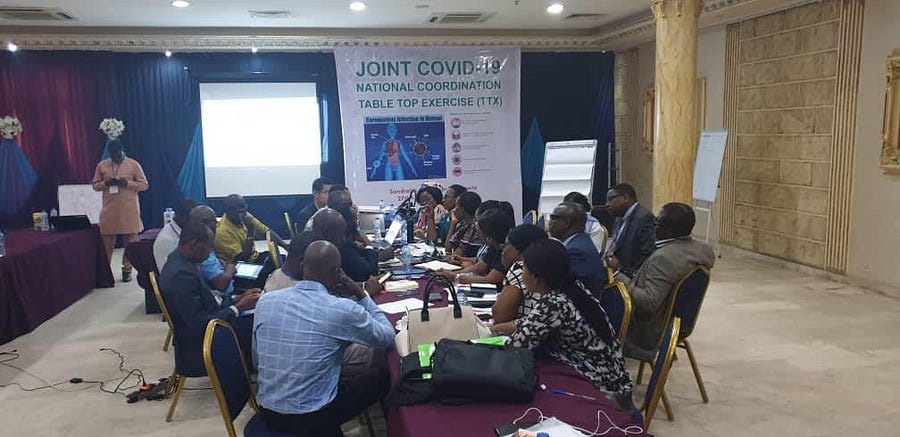
I was to travel to Ogun state, to the facility where the first case was detected to ensure that the state response was proceeding as planned. So, at 6:00am, Saturday morning not knowing what to expect, I joined the NCDC Rapid Response Team (RRT) in Abeokuta to meet and coordinate with state officials. On arrival we proceeded to meet with the Honourable Commissioner for Health, Dr Tomi Coker and her team where we supported the quick establishment of the Incident Management System (IMS) and Emergency Operations Centre (EOC). We all then proceeded to the facility in the company where the index case was detected and where the 40 contacts were quarantined.
On arrival, I was impressed with the work the company health facility, state epidemiology and surveillance team had already done. They had quickly listed and quarantined all the contacts of the index case, in a good quarantine location, and were already monitoring for symptoms and signs of COVID-19. To get further epidemiological and clinical details on the case, I requested to speak with the doctor that made the diagnosis.
When first I spoke with Dr. Allison, (her story here) she sounded nervous, so I tried to establish a good rapport by first talking about general things she was interested in; her interests and hobbies because from my experience I know that being in quarantine for a highly infectious agent is a very psychologically distressing experience. I found out that she is a fitness enthusiast like me so it was easy to establish rapport. When we got talking about the information we needed, I was very impressed by her clinical acumen and high index of suspicion for COVID-19, as she had been able to quickly diagnose the index case, even though he did not have the common presentation of cough or other respiratory symptoms. She was able to recall very detailed aspects of the patient’s travel and clinical history which helped us immensely with our investigation.
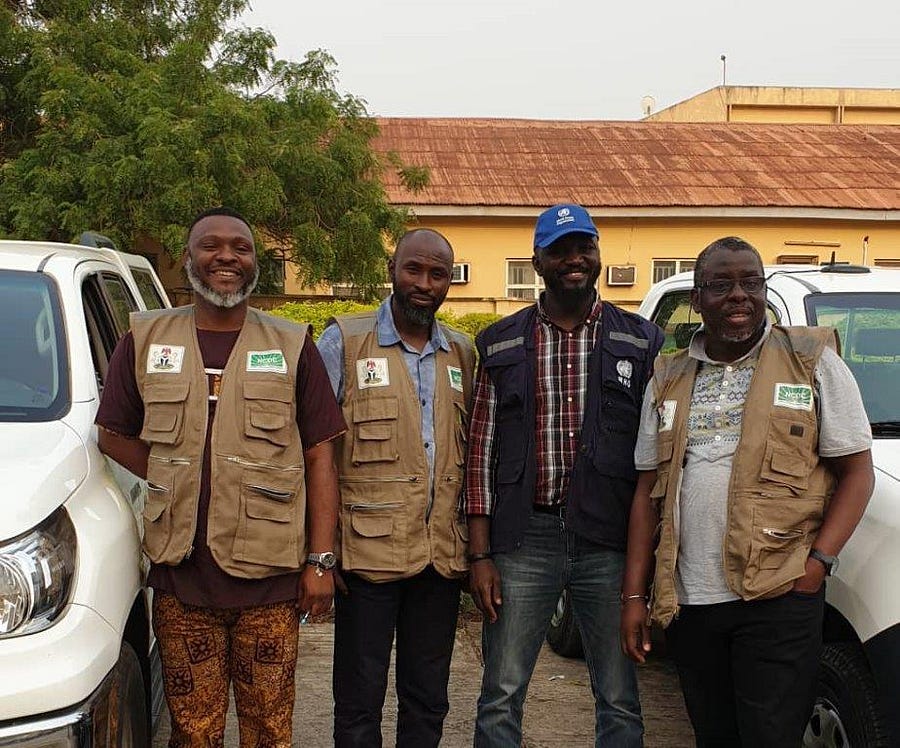
Dr Allison and her team’s quick action, adherence to COVID-19 detection protocol and good Infection prevention and control practices to isolate and notify authorities of their suspicion, also meant that after 14 days, all but 1 of the 40 contacts quarantined tested negative (including herself and 4 other health workers) and were released. We were happy that she could get all the COVID-19 information she needed from the NCDC and WHO websites. We proceeded to quickly organize a refresher training on Infection Prevention and Control (IPC) at their facility. Over the next four weeks in the state it was a frenzy of trainings on EOC/Incident Management System (IMS), IPC, Case management, surveillance and contact tracing, community sensitizations as well as monitoring of the contacts, tracking down rumours and so on. This was all in a bid to ensure there was a strengthened system of emergency response on the ground.
Fast forward to Kano State where I am now after supporting several other states’ responses; the context of the outbreak is quite different. The country has gone from sporadic cases in February to community transmission in some states and 35 out of 37 states reporting cases (Nigeria as at 15th May has 5,445 confirmed COVID-19 cases); airports have been shut, schools/public places closed and movement has been restricted. Kano is a much larger state with a massive, densely packed population of about 13 million people that mostly need to go out daily to earn a living, several of whom travel in and out of the capital city to trade. This has put a strain on the state’s system and requires surveillance and response on a different scale.
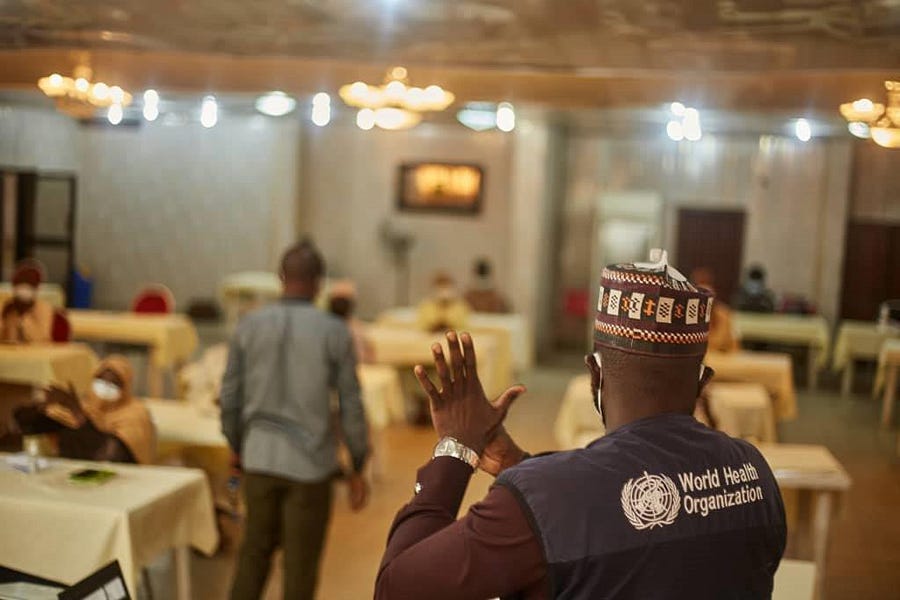
There is a need for rapid and widespread retraining of clinical health workers in infection prevention and control to protect themselves, and a very quick expansion of the workforce for surveillance to get ahead of the outbreak. A lot of risk communication and community engagement is required to dispel myths, misconceptions and rumors as we have seen in the past in the Ebola outbreak in 2014 and to create the behavioral change needed to ensure the control measures of respiratory etiquette and hand hygiene are widely accepted and adhered to. It is also needed to ensure adequate compliance with movement restrictions that are so important to controlling the spread of the virus.
The pandemic is teaching us
There are a number of lessons and best practices that the COVID-19 pandemic is teaching us. One, it shows clearly how important it is to decentralise capacity for surveillance and epidemiology; the Ogun state epidemiologist and his team had participated in a national RRT training we had supported the NCDC to develop, he was also a Field Epidemiology and Laboratory Training Program (NFELTP) graduate and this showed clearly in the way his team quickly investigated the contacts of the index case. This highlights the importance of massive public health workforce development through training and retraining.
Secondly it is necessary to ensure clinical staff at even the smallest health facility has up-to-date training and the resources to make rapid diagnosis, practice good IPC (including having the right Personal Protective Equipment) and have quick referral systems for suspected cases of any disease, including previously unknown diseases or what we call “disease X”. This was critical to containing this first chain of transmission in Ogun state, and is proving critical to curtailing health worker infection in other states. This also further reemphasizes the need for large investments in infrastructure at the primary, secondary and tertiary health levels, Nigeria hosted the leadership of countries in the continent in 2001 pledging to commit 15% of their budgets on healthcare; the Abuja Declaration. A promise that few African countries have kept.
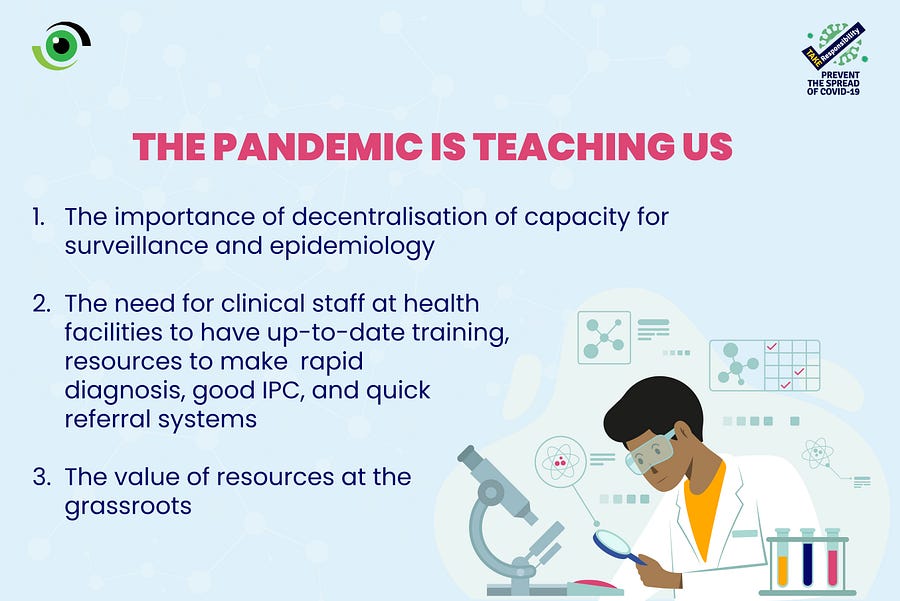
Thirdly, the value of resources at the grassroots cannot be overstated. The contacts of the index case in Ogun state were comfortably quarantined in a company guest house with power, water, food for 14 days which made it easier to bear. For the majority of Nigerians and Africans who are expected to self-quarantine this may not be the case because they need to go out to earn a daily living. Improved social security and welfare for every citizen is necessary for this to be possible. Of course, a large proportion of citizens’ income is spent on healthcare so universal health coverage will greatly reduce financial strains experienced by the population as well as increase the population’s resilience to outbreaks because people are generally healthier and thus reduce severity of comorbidities, a major risk factor for death when a person has COVID-19.
While the outbreak is still ongoing in the country, it is important to celebrate small wins and the country is encouraged by simple acts of courage. Knowing that so far 1,320 patients have completely recovered and discharged shows that surviving COVID-19 is possible with early detection, observing precautions and seeking care early. Though this will be a long battle, this is one that we must win- we must beat this.
Author’s bio: Ibrahim Mamadu is a medical doctor and public health/epidemiology specialist that works in the World Health Organisation Health Emergencies (WHE) program as a Country Emergency Preparedness and International Health Regulations officer. He coordinates global health security and epidemic preparedness and has been an advocate for funding and implementation of the National Action Plan for Health Security and Country Preparedness Plans. He is on Twitter and Instagram as @ibrodoc_03.


